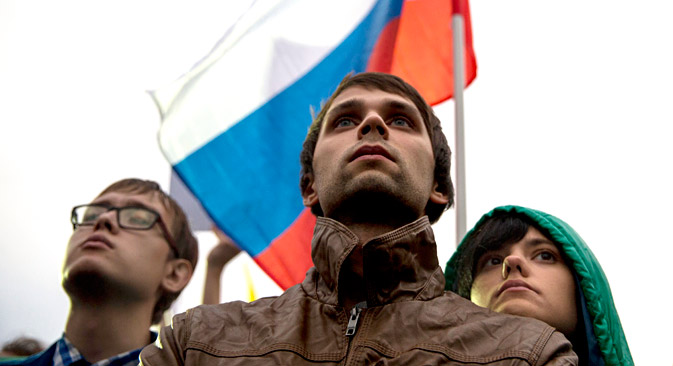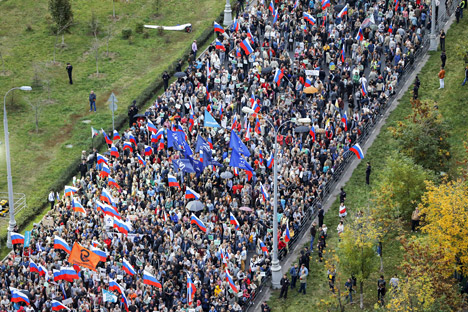
Opposition supporters attend a rally in Moscow. Source: AP
Despite claims by leading liberal figures that Russia’s opposition remains a force to be reckoned with, observers say that the increasingly low turnouts at organized protests are a sign that the movement is slipping into irrelevancy.
The opposition’s latest rally, staged in a suburb of Moscow on the evening of Sept. 20 under the slogan “For the possibility to replace those in power!,” gathered from 4,000 (according to the Interior Ministry) to 7,000 participants (according to the organizers, whereas their original application was for 40,000 people), making it the second-biggest opposition protest this year.
The protest, which had been sanctioned by the city authorities, was timed to coincide with the fourth anniversary of the controversial 2011 “swap” in which then-Prime Minister Vladimir Putin announced that he would be seeking a third presidential term, while then-President Dmitry Medvedev said he would not be running in the election. The exchange of power sparked large protests in Moscow and other Russian cities
The first one was a march of mourning for opposition leader and former First Deputy Prime Minister Boris Nemtsov, assassinated in February 2015, which gathered some 16,600 people, according to official figures alone.
Yet opposition leaders themselves appear to be satisfied by the turnout at the Sunday rally, with deputy chairman of PARNAS (People’s Freedom Party) Ilya Yashin telling RBTH that the attendance proved that his party was a force.
“Despite the fact that we had been squeezed out to a suburb of Moscow, many people came,” he said, adding that “there is in effect no other political opposition force capable of galvanizing, despite constant pressure and propaganda attacks, such a number of its supporters.”
The opposition agreed to the venue in the residential suburb of Maryino after their application for a venue in the center of Moscow was rejected. If previously the organizers refused to accept a suburban alternative and just canceled their plans for a rally, this time round they decided not to defend their “right to central Moscow” with a boycott.
“If we do indeed have political and economic demands to the powers that be, we can declare them in Maryino too,” Alexei Navalny, the liberal opposition leader behind the rally, wrote in his blog.
Yet the rally did not voice any topical economic demands to the authorities, only political ones: to give up censorship (which ironically officially does not exist in Russia as it is supposedly banned by the constitution), to free political prisoners, to end the war in southeast Ukraine, to combat corruption and to ensure “unconditional access to elections for the opposition.”
It is worth pointing out that the protest was held just a week after the regional and local elections, in which PARNAS got under 2 percent of the vote and did not make it to the Kostroma Region parliament.

Thousands of people rallied on the streets of Moscow. Source: Reuters
After such a “defeat”, Navalny simply could not afford “to sit it out somewhere in the shadow”, said the head of the independent Political Expert Group, Konstantin Kalachev.
However, with their main slogan – “for the possibility to replace those in power” – the organizers have misfired, he said: “To have the possibility to replace those in power is a good thing, and it is available at the regional level, take Irkutsk for example. Whereas people in the regions are far more concerned by the social agenda.”
According to Kalachev, the opposition’s prospects are even more pessimistic if they decide to use the same slogan in the upcoming federal elections.
“To fight the State Duma election under this slogan when there are 14 parties that have the right to run in elections without the need to collect signatures [a demand often used to create obstacles to parties registering for elections – RBTH] is somewhat strange. The majority of the population will not respond to it,” he said.
At the same time, it would be wrong to describe both opposition projects – the regional elections and the rally – as a complete failure, says managing director of the independent Center of Political Information Alexei Mukhin, since opposition figures are again a focus of attention.
“Unfortunately, they are a focus of attention mainly for foreign observers. This is slightly alarming, as it puts the opposition into the marginal zone of the notorious fifth column,” he said. Any hint that an organization receives funding from abroad is often used by the government to claim that they are “fifth columnists” operating on a shady agenda.
Furthermore, Mukhin claims, the authorities are “quite effectively” stealing the opposition agenda, with recent anti-corruption moves by the government such as the dismissal of the governors of Sakhalin and the Komi Republic. Opposition leaders should broaden the range of theses they address to the public since the emphasis only on negative things and on protest for the sake of protest no longer works, said Mukhin, “as demonstrated by the gathering in Maryino.”
For their part, opposition leaders do not agree that protest sentiment is waning, although they admit that the number of people who are ready to take to the streets has indeed dropped over the past several years.
“After those rallies people were put in prison, prosecuted, questioned, their homes were searched. An opposition leader was assassinated. Against this backdrop, protesters have become less numerous but the number of discontented people is rising,” said Yashin.
All rights reserved by Rossiyskaya Gazeta.
Subscribe
to our newsletter!
Get the week's best stories straight to your inbox